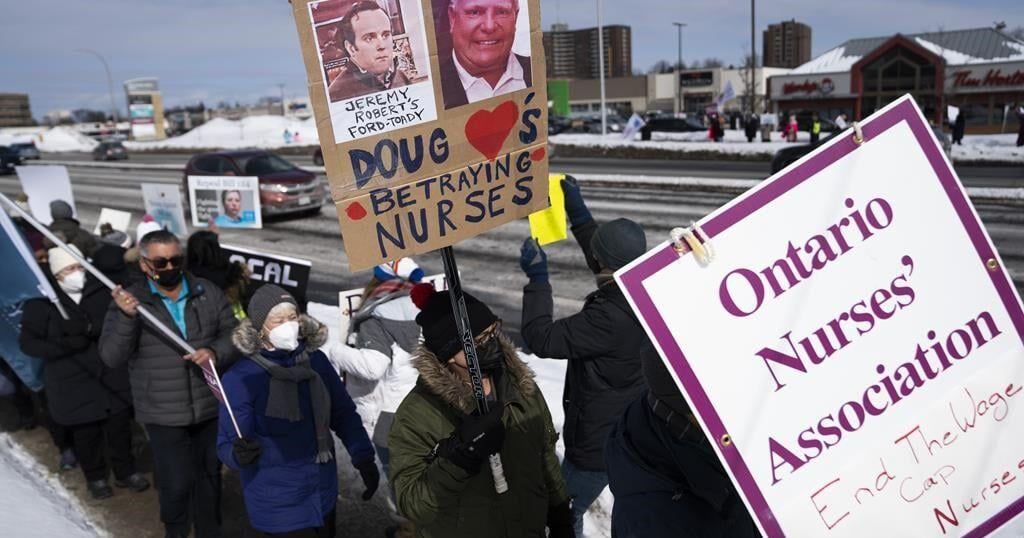TORONTO – Ontario taxpayers have forked over $4.3 million in legal fees after the province lost two court cases defending a wage-cap law that was struck down as unconstitutional, The Canadian Press has learned.
Premier Doug Ford’s government passed a law — known as Bill 124 — in 2019 to limit salary increases for broader public sector workers at one per cent per year for three years. At the time, the province said it was done to help eliminate the budget deficit.
The law sparked outrage among the 800,000 workers affected by the bill. Scores of nurses, teachers and public servants brought their grievances to the province’s front door, with vociferous protests at Queen’s Park.
Medical officials said the law contributed to the nursing shortage during the pandemic, a time when hospitals were overrun. The law also contributed to the teacher shortage, education officials have said.
The unions that represent workers affected by the bill took the province to court, labelling the law unconstitutional. The province argued the law did not infringe constitutional rights, saying the Canadian Charter of Rights and Freedoms only protects the process of bargaining, not the outcome.
In 2022, the Ontario Superior Court agreed with the workers and struck down the law. The province appealed the ruling.
While Ontario used in-house lawyers for its initial case, it hired an outside firm, Lenczner Slaght, to handle the appeal.
In a 2-1 decision earlier this year, the Appeal Court struck down the law, saying it infringed on workers’ Charter rights. The province accepted defeat and, soon after, repealed the law in its entirety. The court left it up to the parties to settle legal costs.
In June, The Canadian Press asked the Ministry of the Attorney General for a breakdown of the costs. Several months later, it has shared the information.
The province settled with the 10 unions that took them to court and agreed to pay them $3.45 million in legal costs, said Keesha Seaton, a ministry spokesperson. The province also paid Lenczner Slaght $856,482 for legal services related to the appeal.
The office of the President of the Treasury Board Caroline Mulroney defended the law and the subsequent legal battle.
“Bill 124 was designed to employ a fair, consistent and time-limited approach that would enable the government to protect front-line jobs and workers for years to come,” said Liz Tuomi, Mulroney’s spokeswoman.
“The government continues to be open, transparent and accountable to the people of Ontario for every tax dollar spent, which can be seen through our seventh consecutive clean audit opinion from the auditor general in this year’s public accounts.”
Last month, Finance Minister Peter Bethlenfalvy, who brought the bill forward when he was president of the Treasury Board, said the law was “absolutely not” a bad idea.
“We ran again in 2022 and got a bigger majority, so I feel very good that the people of Ontario gave us a vote of confidence in the way we’re managing the economy and managing the fiscal path to balance,” he said.
The province has so far paid out $6.7 billion for retroactive pay increases to broader public sector workers after the law was struck down.
Taxpayers would have been on the hook for those salary bumps either way, but the additional legal costs were a waste of money, leaders of the opposition parties said.
“This is outrageous, and it’s also wasteful, and I would say that people deserve a government that they can trust to spend their money on what matters to them,” said Marit Stiles, leader of the Official Opposition New Democrats.
“Doug Ford and his politicians treat government money like it’s their money — it’s not, it belongs to the people.”
The government had fair warning the bill would be found unconstitutional, said Green Party of Ontario Leader Mike Schreiner.
“I think it’s just a slap in the face to the people of this province that we have to foot the legal bills of the government’s failure to recognize that wage restraint is unconstitutional,” he said.
“I think it just shows how out of touch this government is with the needs of everyday people that they would waste money on legal fees in support of unconstitutional legislation.”
Ontario Liberal Party Leader Bonnie Crombie agreed.
“It is unacceptable for Doug Ford to have spent millions of your tax dollars to prevent teachers and nurses from earning a fair wage,” she said.
This report by The Canadian Press was first published Oct. 15, 2024.
